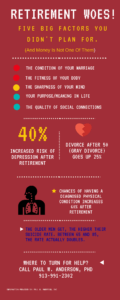
Any transition you’ve made that resembles what is commonly referred to as “retirement” has brought you face-to-face with the Big Five Retirement Factors that have a huge impact on the quality of your life. It’s likely you didn’t see the hit coming, because no one told you to prepare for these facts of life after full-time working.
In fact, you hid these factors from yourself with your own denial about their importance.
The myth is, “All you need is enough money and retirement will indeed be the golden years you’ve always been told will come your way.” Nothing could be more false or goofy thinking.
Money does not give a person purpose or direction in life. A large retirement cache does not make up for a marriage that was emotionally neglected for a couple of decades while all that money was being stashed. Money by itself does not make it easier for the retired couple to make new friends after they move to “paradise.”These are the critical factors required for a quality retirement but most wealth managers only focus on the size of nest egg.
Here are the Big Five Retirement Factors most people in America don’t plan for:
- The relationship you have with your spouse and family
- The relationship you have with your body
- How you treat your mind and keep it conditioned
- Your purpose and meaning for life
- Your social connections
Let me hurry along to anticipate what you may be thinking: “What about money?” Well, that’s my point. We are taught and encouraged to prepare for retirement by doing what? The answer is, “Get a retirement income plan.” Be diligent concerning money to be set aside to take care of you in retirement. Think about your 401(k), think about your other investments, worry about what security will be there for you when you do stop working full-time…. these are the considerations we are taught to believe in and manage in order to do well in retirement. All well and good, but not enough.
Income for retirement? Sure, but what about “marriage” for retirement or “body” or “mind” for retirement. Have you thought about those preparations?
Here’s The Sad Fact About Big Five Retirement Factors!
Based on what I see in my counseling office, no matter how much money you have in retirement, or for that matter, how little, money will not substitute for lack of attention to preparation for the Big Five. I encourage you to stop hiding from these issues and deal with them. It’s never too late.
Men I have worked with often discussed with their wives the reality that they can’t retire yet because there isn’t enough in the investments to support them if he quits work now. He then suggests he stay in the workforce and they hire a financial advisor to help.
I have not heard a wife say to her husband who thinks they are in good retirement shape financially, “No, honey. We can’t retire now. Our marriage needs work to support us in retirement. Let’s find a marriage counselor and prepare our marriage for what lies ahead.” Why is that?
Have you had a friend postpone retirement until he or she tuned up their mind and mental capacities so they will have the cognitive strength to deal with all the identity and adjustment challenges retiring can bring? Why is that?
I have heard the wife of a retired millionaire tell me she thinks her husband has given up on life. A wealthy husband in retirement complains to me that all his wife wants to do is drink too much and he wants to travel internationally, now that they have the time and can afford it.
Spouses of both genders have sought out counseling and coaching from me on how to deal with spouses who have no desire to do the enjoyable things, like hiking and exploring, which they had both gleefully anticipated prior to retirement.
More Facts We Try To Ignore
Retirement increases the risk of clinical depression by 40%. Your chances of being diagnosed with a physical condition increases by 60% after retirement. Marital discord increases after retirement. So-called “gray divorce” (persons over 50 who divorce) has increased to 25 percent, versus only 8 percent in 1990.

Even though life spans for both men and women continue to increase, quality of life may be decreasing. Mental capacities are neglected, people have difficulty finding a reason to live and old friends are not replaced. I call these realities the thieves who stole the joy of living from the last part of life. Feeling lost in retirement is common.
Looking back after leaving work and hiking off to the retirement paradise of their dreams, people frequently ask, “What in our world has gone wrong? We thought we had everything under control only to find ourselves now feeling empty and living an unsatisfying life.”
Realization seldom matches anticipation. Because of that fact, it is wise to prepare, as best we can, for all eventualities, not just the financial ones?
The Unanticipated Effects of Loss and Change. Transitions are Dangerous.
A big chunk of what happens in retirement transition is loss. It is not easy to anticipate, for example, the impact the loss of a man’s work can have on his marriage. Men need to feel effective and admired. When they go to work, the need to feel effective can be met in a variety of ways, including bringing home the bacon.
A man may need to feel admired. That can be met by the way co-workers respond to him, his orders or direction and the way they coordinate their behaviors with those of his. When a man retires, the needs for structure, purpose, meaning and a sense of value in life suddenly are no longer met. However, the needs are still there. Unfortunately, his spouse is not the one to fill in those voids.
If the couple has not assessed the condition of their marriage nor the future effects of these kinds of losses on their relationship, they can be in for a big surprise. One recent study of modern couples in retirement concluded the following;
Couples who are transitioning from full or part-time employment to retirement frequently do not realize the impact this life transition will have on their marital relationship. Due to increased longevity and early retirement patterns, couples can expect to spend a significant portion of their marriage in retirement.
Few couples work to prepare their marriage for this new life stage and are surprised by the changes and challenges they experience in their marriage as a result of retirement. Just as couples financially prepare for the retirement transition, couples need to prepare psychologically to ensure their marital security in retirement.
The media portrays an image of an active adult in American retirement communities. Unfortunately, the common pattern is less body movement and a sedentary day. Illnesses flourish under these conditions. Stress and anxiety will show its ugly head one way or the other, most commonly in physical illness, relationship disturbance and/or addictive behavior such as alcoholism. More loss compounded by loss.
Few people plan to manage the culture shock that comes with loss of common routines when they enter retirement. “Where is the best grocery store, a church for us, the utility service providers or the lawn guys when we need them?”
The retired couple may be prepared financially, but they have given little forethought to the other critical Big Five, life-sustaining aspects of their retired existence.
Although there are many resources that can assist people through the challenges of retirement transitions, it takes energy, both mental and financial, to access these resources. The double bind many retirees find themselves or their spouses in, is that they lack the energy, physically and emotionally, to get up and access the resources which could restore energy and quality of life.
What To Do About It
- The first step in tackling any problem is to acknowledge and stop hiding from it. Discuss with your spouse or friends or adult children or any other resource you may be able to easily access how your life has lost quality. State publicly to at least one other human being your intention to do something about your situation.
- You can avail yourself of competent marriage, career counselors and life coaches.
- There are physical trainers who can guide you to regain muscle tone and regular physical conditioning. If physical repair or surgery is necessary, do it.
- With the extra time on your hands retirement can bring, play a little less golf and spend a little more time reflecting on the philosophy of your life which gives you meaning and purpose for living. With some reading and a willingness to entertain mental challenges and problems to solve, your mind will begin to restore itself to former functioning levels.
- It’s always possible to make a new friend, even if just for a moment by speaking and smiling kindly at whoever you may be near in the moment.
- Add structure and meaningful routine to your life. Sitting and sleeping too much are bad for health. You want others to validate and value you for who you are and what you can do? You have to connect yourself to the human race.
- Find a job you love, even if it’s part time.
- Redefine your abilities at this time in your life and put them to use. Hobbies, volunteering, writing your life story, starting a cottage or online business, developing creative or performing skills, play music…keep your field of options as wide opened as possible.
If you have enough money to stave off financial worries in retirement, congratulations. At least you got that one right and you’re good investing financially. Now, give yourself permission to invest in yourself and gain the confidence to tackle the five biggest challenges you must deal with to enjoy retirement. Ignorance is no excuse, especially when it comes to life affecting decisions.
Again, it’s never too late. Let me (Paul W. Anderson, PhD, 913-522-6271) know how I can help you get up, get going and get to work on rebuilding your life as a retired person of whole health. The Big Five Retirement Factors do not have to get you down.





